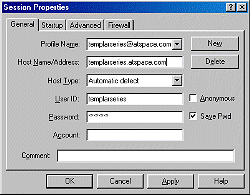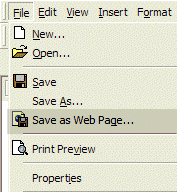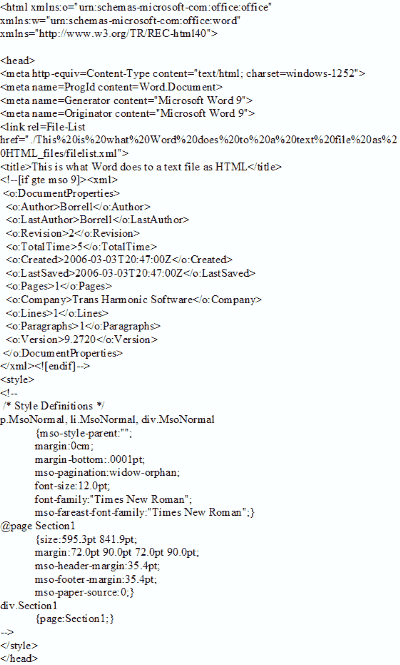
Webspace
To make your own webpages that can be found online for other people to use,first you need some Webspace or FTP (File Transfer Protocol) Space. If you are signed up to an ISP (Internet Service Provider) such as BT or AOL, you may already be given free webspace. If your ISP does not provide you with webspace then you can find your own space online. Several places provide free webspace,you can find this by doing a search on Google, Google itself provides pages to construct websites. As with most organisations online you will need to have a Username and Password. In Google's case you can get free email as well as free webspace. If you are using an online method of web-building,using your ISP's own step by step process - then bear in mind that online time is being used to build the site - whereas using FTP (see below) you can build the site offline and then upload it using either the ISP's software or a 3rd party system. The online tools can sometimes be cumbersome and may not allow you to do all the things that FTP can provide.
This site has been nade using 50webs free space.There are no adverts on 50webs.Some hosts manage to provide free space by carrying adverts on their sites.This can slow down access to your site. 50webs also has it's own uploader which is pretty effective.
Uploading with FTP

![]() There are generally,a couple of ways to upload files to
the webspace - if you have your own ISP then they may use their own file
transfer protocol,AOL does this. If it is an online site such as Google or
one of the free services then they may have their own system for uploading
files. Usually there is a limit to how many files you can upload and how
big the files can be to transfer.The limits are denoted in K
(Kilobytes) or Mb
(Megabytes).
There are generally,a couple of ways to upload files to
the webspace - if you have your own ISP then they may use their own file
transfer protocol,AOL does this. If it is an online site such as Google or
one of the free services then they may have their own system for uploading
files. Usually there is a limit to how many files you can upload and how
big the files can be to transfer.The limits are denoted in K
(Kilobytes) or Mb
(Megabytes).
Some ISPs will allow 3rd party software to do the transfers for you and some use their own online site building tools. Systems such as WS_FTP from Ipswitch or Cute-FTP are available online as downloads - usually free or as BETA test versions and allow quick and easy transfers of multiple files just as if you were using Windows Explorer. Take note that sometimes you may have to specify whether the file you are uploading is BINARY (made of 1's and 0's) or ASCII (American Standard Code for Information Interchange).Text files and HTML are ASCII whilst images and compressed (.zip) files are Binary.It is as well to learn about file formats before engaging in FTP.You may also need an FTP address (which is usually something like members.aol.com,upload.ntl.com or ftp.fortunecity.com) if you are signed to an ISP and using 3rd party software - if you are using an online system such as Yahoo - then they have their own FILE MANAGER which does the uploading for you.
Shown above is the connection screen for WS-FTP which requires you to enter
a Profile Name,Host Address,Host Type,User ID,Password and Account.Note that
you can also log onto FTP anonymously,which you may do if you are not logging
onto your own account.Some FTP spaces allow access to users for download
purposes.The profile name is something you decide on to indicate which FTP
space you are accessing,so this is just a name that you make up to recall
what your FTP access details are. The Host Address is given to you by the
ISP or webspace provider,if you do not know this - you will need to
contact them to find out what it is.The User ID is that given to you by your
ISP or Host provider and is usually similar or the same as your email account
name.The password is provided by the Host too and should be entered to allow
you
 access to your webspace.On the "Advanced" settings you can choose
what folders the program will start in as the webspace might not automatically
end up in your own folder.
access to your webspace.On the "Advanced" settings you can choose
what folders the program will start in as the webspace might not automatically
end up in your own folder.
HTML
The basic format of a webpage is HTML (Hyper Text Markup Language) which is really just a text file with special tags in it which give instructions to the computer as to how to display the page. HTML itself is outside the scope of this document,but there are many references to it online,and large amounts of information is available about HTML and it's recent updates XML,this can be found by searching GOOGLE using the search engine icon to the left of this page. In order to make your own HTML you will need a HTML editor such as MS Frontpage or AOLpress.MS Word and the other MS components are also capable of making HTML for upload to your FTP space,but they tend to add additional script which can confuse some of the sites that provide free webspace.
As an example of what Word does to a basic textfile,the following is what is produced from a single text sentence "This is what Word does to a text file as HTML" typed into Word and saved in HTML format.

As you can see it is a lot longer than the original sentence and a lot more complicated than is actually necessary in order to get the sentence to show online. It is possible to use Notepad as a HTML editor - but this is not recommended unless you are an expert.Search the web for HTML editing software or check whether your ISP or online webspace host provides HTML tools for making webpages. Usually though,online tools are not as effective as software designed specifically for the job. If you are using Internet Explorer then the editor that it is using may well be shown on the toolbar under the EDIT icon.
If you wish to learn how to make webpages effectively then either use some of the online lessons or tutorials or sign up for an HTML course,as it is fairly involved. Basic text files will show online,and it is also possible to use online editors which add the HTML tags themselves to save you the bother. If you are using online webspace such as Yahoo,they may also provide an online editor into which you can type text or add graphics and make webpages that way. This way of doing things tends to result in rather basic webpages that have no style,so finding out how to do it offline and then uploading via FTP usually produces better results.
If you do not wish to learn HTML or if you wish to use a template-based system,then use of a Blogger may well suit you better. These are similar to web-based websites like Yahoo and allow uploading of text and images,but also allow feedback and commenting either from members of the blog or by anyone who happens across the site. Some bloggers allow altering of the HTML code that they have created by use of templates,this means you can start by using a template-driven system,but then graduate to HTML as you learn how to alter the blog by use of the HTML code. Whilst you can find blogsites by use of Google or any search engine,there are search engines dedicated to finding bloggers such as Technorati.
If you have your own domian then it maybe possible to have the blogger show under the domain name,that is,if you happen to own the domain name www.domain.com and have the blogger show under that domain then your site at yoursite.blogsite.com will show it's content at www.domain.com which means you can have a memorable domain name but have the coding for the site created by a template-driven blogger,and save yourself the bother of having to publish HTML code to the FTP space.
Top of the blogs
BY TOM PHILLIPS |
|||||
METRO and Ask.com have teamed up to present the Best of Brit Blog Awards 2007. Blogs have changed the way people communicate, the way the media works and the way information spreads around the world. They have also been responsible for a significant increase in the number of kitten pictures in the world. In the world of blogs, you can find just about anything: informed political commentary that outdoes many papers, deeply involving personal stories, hysterically funny humour writing - and pictures of kittens. The awards will recognise the very best in British blogging - nominated by you, and decided by an expert panel of celebrity judges including Alan McGee (founder of Creation Records), England cricketer Alastair Cook and Channel 5's Jason Bradbury.
Go to metro.co.uk/blogawards And, hopefully, we'll introduce our readers to a few new gems along the way. You can nominate your favourite blogs in categories of Arts and Entertainment, Fashion, Sport, Politics, Travel, Technology, Youth (for bloggers under the age of 18) and Weird & Wonderful. And, as part of the awards, Metro has got together with Vox, one of the world's top social blogging services, to give you the chance to create your own free blog - so you can share your photos, videos and your life with your friends, and become part of the Metro online community. To nominate your favourite blogs for the awards, go to metro.co.uk/blogawards - where you'll also find our helpful guide to blogging, podcasts to give you hints and tips, and the chance to start your own Vox blog. You have until March22 to get your nominations in, so don't delay! Get going with Vox and MetroWE'VE teamed up with blogging pioneers Six Apart to offer Metro readers the chance to get blogging with Vox - the new free social blogging service. You'll get a choice of special Metro designs for your blog and you'll became part of a connected community of Metro readers, from your city and around the UK. And, of course, we'll be blogging ourselves at metrouk.vox.com. Six Apart - the people behind leading software Movable Type and the immensely popular LiveJournal - have now put all their knowhow into Vox, a personal blogging service that aims to make blogging as fun as it is easy. Vox is perfect for keeping in touch with your friends and family. It also makes it easy for you to organise and share photos, films, books and music with others, from popular sites such as Flickr and YouTube. And because of its privacy options, which let you decide who you want to be able to read each post; you won't have to worry about your boss stumbling across something embarrassingly personal. Add to that the stylish design, the vibrant community of users already blogging there, and controls so easy to use that even your Aunt Vera could understand them, there's no reason not to join us... [Metro Thursday, February 22, 2007]
|
|||||
Set those websites alight
|
|||||
| A company website can be much more to your enterprise than just a
sales vehicle. Used wisely, it can also help you gauge your customers' needs,
says JAYNE ATHERTON
Selling via Internet sites is a well-established practice but, for the entrepreneur and small business owner, the virtual world offers even more opportunities to help your business thrive. Today, understanding the importance of running a commercial site is crucial to your company's success. Even if you don't intend to sell products or services via your site, it is still an important vehicle through which to attract customers and keep them interested. Remember that growth is driven by new customers and repeat orders. The Internet can also help you develop an idea of who your customer is and what they are interested in - the more you know about them, the easier it will be to meet their needs and develop products or services that will sell. Many software packages let you build up your database and analyse your typical customer so that every visit to your site will develop your business.
Keep their interest
Regular maintentance
Build on success
Log on to www.metro.co.uk/yourbusiness for details of setting up your own company, including choosing the right professional business behaviour. |
Points to remember about making Websites:
Glossary |
|
| Kilobyte | A unit of measurement of the computer's memory equal to 1024 bytes. |
| Megabyte | A unit of measurement of the computer's memory equal to 1024 kilobytes. |
| Text File | A type of file that only contains text characters.Letters and numbers. |
| Script | Additional programming language elements added to HTML. |
| ISP | (Internet Service Provider) The company who provides you with internet access. |
| FTP | (File Transfer Protocol) The method by which HTML files are transferred from your PC to the ISP |
| HTML | (Hyper Text Markup Language) The language that webpages use to display information online. |
|
Further Glossaries |
|
Learning Computer-ese |
|
Jargon Buster |
|
Hacker Jargon |
See Also The Web Q&A and Building Websites , Webpage Editor , Create your own Website, HTML Tutorial, HTML Help.com , Amazing HTML,Blogger,Travelblog,Blogsite